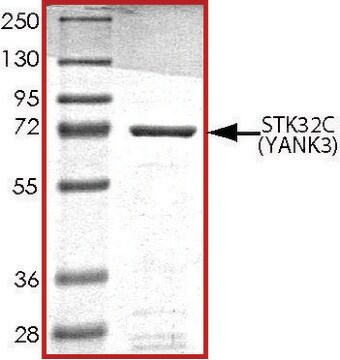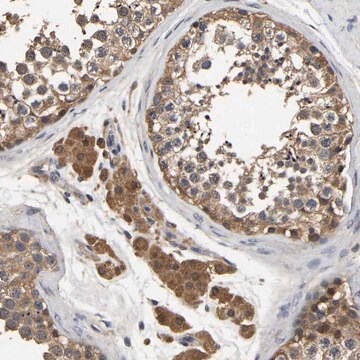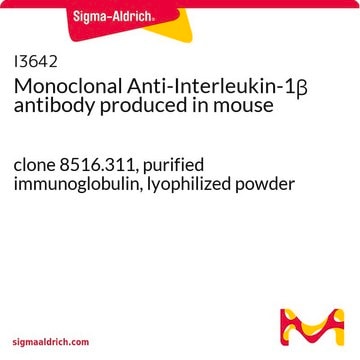SRP6307
BPI from human neutrophils
≥95% (SDS-PAGE)
Synonyme(s) :
BPI, Bacterial/Permeability, CAP57, Increasing Protein
Se connecterpour consulter vos tarifs contractuels et ceux de votre entreprise/organisme
About This Item
Code UNSPSC :
12352204
Nomenclature NACRES :
NA.32
Produits recommandés
Description générale
Bactericidal/permeability increasing protein (BPI) is a 456 residue protein which is part of the innate immune system. BPI was initially identified in neutrophils, but is found in other tissues including the epithelial lining of mucus membranes. It is an endogenous antibiotic protein with potent killing activity against Gram-negative bacteria. It binds to compounds called lipopolysaccharides produced by Gram-negative bacteria. Lipolysaccharides are potent activators of the immune system; however BPI at certain concentrations can prevent this activation. Bacterial/Permeability-Increasing Protein (BPI) is present in the azurophilic granules of polymorphonuclear leukocytes (PMN). BPI is toxic only toward Gram-negative bacteria. This specificity is attributable to the strong attraction of BPI for the lipopolysaccharides (LPS) in the bacterial envelope. BPI is also an important antigen for anti-neutrophil cytoplasmic autoantibodies (ANCA) in vasculitis.
Forme physique
Frozen in 80 mM Citrate Phosphate, pH 5.6, 0.75 M NaCl.
Code de la classe de stockage
13 - Non Combustible Solids
Classe de danger pour l'eau (WGK)
WGK 3
Point d'éclair (°F)
Not applicable
Point d'éclair (°C)
Not applicable
Certificats d'analyse (COA)
Recherchez un Certificats d'analyse (COA) en saisissant le numéro de lot du produit. Les numéros de lot figurent sur l'étiquette du produit après les mots "Lot" ou "Batch".
Déjà en possession de ce produit ?
Retrouvez la documentation relative aux produits que vous avez récemment achetés dans la Bibliothèque de documents.
Maria K Magnusson et al.
Inflammatory bowel diseases, 23(6), 956-966 (2017-04-27)
The clinical disease course of ulcerative colitis (UC) varies substantially between individuals and can currently not be reliably predicted. The gut microbiota and the host's immune defense are key players for gut homeostasis and may be linked to disease outcome.
Notre équipe de scientifiques dispose d'une expérience dans tous les secteurs de la recherche, notamment en sciences de la vie, science des matériaux, synthèse chimique, chromatographie, analyse et dans de nombreux autres domaines..
Contacter notre Service technique

![Sodium tetrakis[3,5-bis(trifluoromethyl)phenyl]borate](/deepweb/assets/sigmaaldrich/product/structures/251/439/7a621e74-bfd1-4a43-833c-09adfcc1e0b3/640/7a621e74-bfd1-4a43-833c-09adfcc1e0b3.png)






